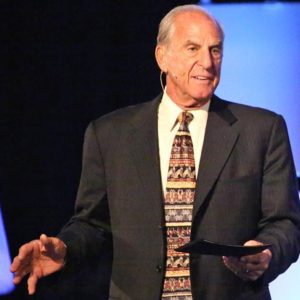Take time now to answer this question.
The C.E.O. of a multi-million dollar corporation died in his Chicago office at age 57. When his huge, solid-oak desk was later cleaned out, a hand fishing line, with hook, sinker and bobber attached, was found at the bottom of one of the drawers. He had used it as a child, while growing up on his parents’ farm in Illinois. But he hadn’t gone fishing in years; why was the fishing outfit in his office? We can only speculate.
After high school, he earned a scholarship to one of the Ivy League universities. He graduated, found a job, got married, bought a home in the suburbs, and worked hard. Then the children came along, and soon he was working even harder to provide himself and his wife with some of the finer things, as well as to send his youngsters off to college. As the years passed, there were promotions and increased involvement: clubs, civic organizations, professional associations, and a briefcase full of work, which he brought home every evening. Crises, at home and at work, were faced and overcome, and after thirty years of arduous work he earned the top job in his company.
As chief executive officer, he was responsible to stockholders, customers, and hundreds of employees. Sales, finance, marketing, research and development, service…these became his life blood. And by then, the children were out of school, married and raising families of their own.
It all happened so quickly, without any planning. First school, then work, then a family, a few promotions and there he was: king of the ant hill.
But one day, toward the end of it all, he was at home on a Saturday afternoon, getting something from the attic for his wife, and he found that old fishing line. It was covered with dust, the paint was peeling off the bobber, and the line nearly disintegrated in his hands, but it instantly brought back memories of his parents’ farm: the quiet, cool creek, the grassy banks, the moss-covered rocks, the frogs plopping into the water, and the shade of the huge willow. He could recall the thrill of seeing the bobber disappear, the tug of a feisty bluegill, and a whole stringer full by sundown, and he wanted to go back.
Suddenly, while standing in the attic on a Saturday afternoon, he realized that nothing in his entire life had been quite so real, so elemental, so satisfying, as fishing from the banks of that creek. Chewing on a sprig ofgrass, feeling the sun on his shoulders, and watching the sun go downóthat was really living, and yet he hadnít taken the time to go back. He had been too caught up in the chase to visit the old creek, fish for bluegills, and ponderówhat he was chasing, and WHY.
The telephone rang, he shoved the fishing outfit in his pocket and climbed down from the attic. But he wanted to think about the creek again; he felt maybe he should go back and at least see if it was still there. So he took the outfit to work with him on Monday morning, but he was so busy he had to put it in a bottom drawer. And there it remained, forgotten, until his death a few days later.
That’s when the fishing outfit was discovered again and sent to his wife. Of all the things sent home to her, the old fishing outfit was the one that puzzled her. “Why had he taken it to work?” she asked herself. She didn’t know, but it caused her to remember her husband as a young boy and wonder why he had followed the path he did.

Here’s What You Can Do:
Don’t wait to go fishing, or hiking, or sailing. Do it soon. Go back to the creek, the mountain, or the seashore you remember so vividly, and take time to ponder what it is YOU are chasing and why.
-Joel Weldon

